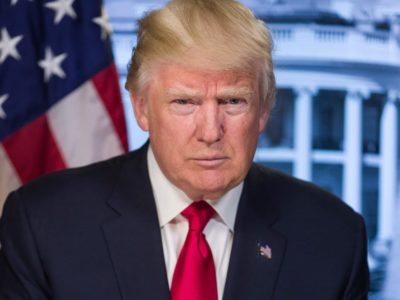The Trump campaign moved swiftly to manage the fallout from former President Donald Trump’s recent comments about Florida’s restrictive abortion laws. During a press interaction, Trump suggested that the state’s current six-week abortion ban should be extended, a statement that quickly ignited controversy among his anti-abortion supporters. The comments came in response to a question about his stance on a forthcoming Florida referendum that could extend the legal limit for abortions beyond 20 weeks. Trump’s response—”I want more than six weeks”—sparked confusion and concern within the anti-abortion movement, leading his campaign to issue a clarification.
Karoline Leavitt, Trump’s national press secretary, attempted to calm the waters later that evening, emphasizing that Trump had not yet taken a definitive stance on the referendum. “President Trump has not yet said how he will vote on the ballot initiative in Florida; he simply reiterated that he believes six weeks is too short,” Leavitt stated. This clarification was aimed at reassuring the anti-abortion community that Trump remains committed to their cause, despite his ambiguous remarks.
Navigating the Political Tightrope: Trump’s Abortion Stance
Donald Trump’s comments on Florida’s abortion law reveal the delicate balance he is attempting to strike as he positions himself for the 2024 presidential election. During his presidency, Trump proudly championed his “pro-life” credentials, most notably by appointing three Supreme Court justices who played a pivotal role in overturning Roe v. Wade. This move was celebrated by anti-abortion advocates nationwide and solidified his standing as a defender of their cause.
However, the political landscape has shifted since the end of federal protections for abortion. Trump has expressed concerns that a hardline stance on abortion could alienate moderate voters and damage the Republican Party’s prospects at the ballot box. He has suggested that decisions on abortion should be left to individual states, rather than being mandated at the federal level. With Florida set to vote on Amendment 4—a measure that would allow abortions up to the point of fetal viability—Trump’s position is under scrutiny. While he has hinted at his discontent with the six-week ban, he has yet to make a public declaration on how he will vote, leaving both supporters and critics eagerly awaiting his decision.
Trump’s Staunch Opposition to Late-Term Abortions and the Impact of Amendment 4
Former President Donald Trump has long been a vocal opponent of late-term abortions, particularly those performed after five months of pregnancy, when he asserts that the fetus can feel pain. This stance aligns with his broader advocacy for parents’ rights and his consistent opposition to policies that expand abortion access beyond this critical point. Trump’s position on this matter is clear: late-term abortions should never be permitted, a sentiment that resonates with many conservative voters who share his belief in the sanctity of life.
Amendment 4, currently under consideration in Florida, directly challenges Trump’s position by proposing to allow abortions beyond the five-month mark. Taryn Fenske, the communications director for Florida Governor Ron DeSantis, echoes Trump’s concerns, stating that the amendment would “allow late-term abortions, eliminate parental consent, and open the door to taxpayer-funded abortions.” Fenske and other opponents of Amendment 4 argue that it would enshrine what they see as an extreme and unlimited right to abortion in the Florida state constitution, effectively preventing the state legislature from imposing any future restrictions on the practice.
The Debate Over Florida’s Heartbeat Law and the Future of Abortion Legislation
Florida’s current abortion law, often referred to as the “heartbeat law,” was signed by Governor Ron DeSantis last year. This legislation prohibits abortions once a fetal heartbeat is detected, typically around six weeks of pregnancy. The law is among the most restrictive in the country, reflecting the strong pro-life sentiment among Florida’s conservative leadership and its supporters. For those who believe in setting strict limits on abortion, the heartbeat law represents a significant victory in the ongoing battle to protect unborn life.
However, the introduction of Amendment 4 has sparked a fierce debate over the future of abortion legislation in the state. Supporters of the amendment argue that it provides necessary protections for women’s rights and reproductive freedom, while opponents, like those aligned with Trump and DeSantis, view it as an existential threat to the progress made under the heartbeat law.
They warn that a vote in favor of Amendment 4 would “lock unlimited abortion into the state constitution,” undermining years of legislative efforts to restrict abortion access and safeguard parental rights. As the battle over Amendment 4 intensifies, voters in Florida are faced with a crucial decision that could redefine the state’s approach to one of the most contentious issues in American politics.
Reactions and Implications for the 2024 Election
Trump’s remarks have sparked a wave of reactions across the political spectrum, with supporters of abortion rights expressing relief and anti-abortion leaders seeking clarification. The latter group was particularly alarmed by Donald’s suggestion that the six-week ban might be too restrictive. Marjorie Dannenfelser, president of Susan B. Anthony Pro-Life America, quickly reached out to Trump following his comments. According to Dannenfelser, Donald assured her that he had not yet decided on his vote for Amendment 4, but she warned that supporting the measure could undermine his long-held stance against late-term abortions.
The controversy underscores the high stakes of the 2024 election, where abortion is likely to remain a central issue. Donald’s ability to navigate this sensitive topic could prove crucial in securing both the Republican nomination and broader voter support. As the Florida referendum approaches, all eyes will be on Trump to see whether he aligns with the anti-abortion movement or opts for a more moderate stance, potentially reshaping the debate over abortion rights in the United States.














